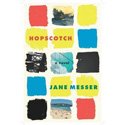 IN 140 CHARACTERS OR LESS:
IN 140 CHARACTERS OR LESS:
Beautifully crafted sentences tell the story of a family, struggling to maintain its functionality in a city of dysfunction.
Format:
At 335 pages of relatively dense prose, this isn’t a quick read, but a thought-provoking one.
The author:
Jane Messer lives in Sydney where she teaches creative writing at Macquarie University. Her books include Provenance, Night by Night and Bedlam – an Anthology of Sleepless Nights. She is a regular contributor to The Conversation, has been a Director of the Australian Society of Authors and a judge of the Australian Vogel Literary Award.
Thoughts:
Having resided in Sydney for 35 years, I feel qualified in saying that living here is like trying to seduce a beautiful, but emotionally distant, woman (or man, I suppose).
You work, and you work, and at some point, you wonder if you might be better off buying a puppy, because you’re just not sure that underneath your lover’s glamorous facade lies any warmth, or any substance. Or anything at all!
But you know one thing – you’re working harder to make it work than your lover is.
That’s Sydney. At least that’s my take on Sydney – and it is against that backdrop that Jane Messer introduces us to the Rosen family.
Patriarch, Sam, has a terminal illness and is grappling with the question of whether the life he has left is worth living. Meanwhile, his wife, Rhonda, has settled uneasily to her role as carer and is in mourning – both for the identity she has lost, and the idea of a future without Sam.
‘To every woman there was the unravelling. She was on the verge of no longer being herself. She had sailed through the births of the children, managed well enough through the death of her father and of Sam’s parents, but this slow withering of his, this she was finding hardest of all.’
Sam and Rhonda’s eldest child, corporate salesman Mark, is standing on a precipice of debt, over which the GFC has sent him into free-fall. Middle-child, Liza, has a biological clock that’s ticking louder than a grandfather clock, yet seems to find herself romantically involved with men who are either losers, or emotionally unavailable, or both. Last of all, there’s youngest child, Jemma, the soft one – who is working, literally and figuratively on finding her own ‘voice.’
We meet the Rosens in the midst of Sam’s 68th birthday party, and we leave them exactly one year later, on Sam’s 69th.
On first read, it seems to have been an annus horribilis for the Rosens; each one is in a state of flux as they ‘leap’ into personal crises. Yet we finish with the sense that worse, and better, lies ahead; 2008 has not been an annus horribilis, it has in fact been just another stepping stone in the hopscotch game that we call ‘life’ – all ups and downs, forwards and sideways movements.
But why aren’t the Rosens more happy? They have each other. And they have Sydney.
‘The city was a grand place to be living in, for anyone, even that homeless guy curled up on the grass… The early morning light cast a cold glow upon the expanse of water. A ferry passed with a neat white slipstreams, on it way toward Milsons Point wharf.’
Yes, the views are glorious – but you can’t eat them. Here in Sydney, you have to work bloody hard for it – 10-12 hour days, book-ended by rage-inducing commutes – all for the glory of paying the ridiculous mortgage on your handkerchief-sized house.
As a title Hopscotch is not only a reference to the changing lives of its main protagonists, but brilliantly reflects the transience and restlessness of the city in which this story is played out. People jump about. They only support a winning football team. Hot restaurants close because newer and hotter ones open. We’re fickle.
Jane Messer understands this, and her characters, well. She writes with an omniscient narratorial presence. We see inside each character’s mind in sentence, after beautifully crafted sentence.
Is it strange to say that ‘the sentence’ is a key feature of the writing? Perhaps. After all, all novels must contain them. But Jane Messer’s sentences are different. They are complete and complex thoughts, rich with metaphor, and surprising in structure. Fragments are few. For instance, when Liza contemplates sex with her ex-boyfriend she recalls how, ‘She’d had a vision of her round cervix plumply useless against the chemical baby-solent smeared onto her contraceptive cap, instead of opening anemone-like toward the sea of silvery spermatozoa.’ See what I mean? That sentence, it’s somehow lush isn’t it? And funny too.
My kids like playing hopscotch. Sometimes, we draw the checker-board pattern onto our pavers with chalk. Inevitably, the rain comes and washes it away. But that’s okay, because we draw it again, and again, and like the Rosens, we just keep trying, and playing and striving, until we get somewhere.
Buy Hopscotch from Booktopia or Angus and Robertson
* In the interests of disclosure, I was a student of Jane Messer’s at Macquarie University and was provided with a review copy of Hopscotch by Pan Macmillan

Pingback: MEET JANE MESSER, AUTHOR OF 'Hopscotch' - Book Birdy